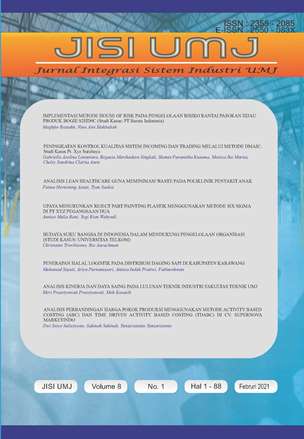Budaya Suku Bangsa di Indonesia dalam Mendukung Pengelolaan Organisasi (Studi Kasus: Universitas Telkom)
DOI:
https://doi.org/10.24853/jisi.8.1.45-53Abstract
Banyak perusahaan di Indonesia yang mempekerjakan karyawan dari berbagai suku bangsa. Setiap suku bangsa memiliki budaya yang berbeda, sehingga diperlukan pengetahuan mengenai budaya mereka agar manajemen dapat lebih memanfaatkan mereka dengan lebih efektif dan efisien. Penelitian ini berfokus untuk pada budaya Suku Bangsa Jawa dan Sunda sebagai suku bangsa yang paling banyak populasinya di Indonesia. Perbedaan antara budaya suku bangsa yang satu dengan suku bangsa yang lain diukur dengan menggunakan dimensi-dimensi budaya bangsa Hofstede. Hasil penelitian menunjukkan bahwa Budaya Suku Bangsa Sunda untuk dimensi jarak kekuasaan lebih tinggi dari Suku Bangsa Jawa, Suku Bangsa Jawa lebih individualis dari Suku Bangsa Jawa, walaupun keduanya sama-sama lebih senang bekerja berkelompok, Suku Bangsa Sunda lebih berambisi untuk berprestasi dari pada Suku Bangsa Jawa, serta Suku Bangsa Jawa lebih siap menghadapi berbagai ketidakpastian dari pada Suku Bangsa Sunda.References
Agarwal, S. (1993). Influence of formalization on role stress, organizational commitment, and work alienation of salespersons: A cross-national comparative study. Journal of International Business Studies, 24, 715-739.
Andreassi, J. K., Lawter, L., Brockerhoff, M., & Rutigliano, P. J. (2014). Cultural impact of human resource practices on job satisfaction. Cross cultural management.
Barth, F. (1998). Ethnic groups and boundaries: The social organization of culture difference. Waveland Press.
East, K.-F. (1999). A world of difference. Published.
Eddleston, K. A., Veiga, J. F., & Powell, G. N. (2006). Explaining sex differences in managerial career satisfier preferences: The role of gender self-schema. Journal of Applied Psychology, 91, 437.
Geert, H., & Jan, H. G. (1991). Cultures and organizations: Software of the mind. McGrawHill USA.
Hofstede, G. (1983). National cultures in four dimensions: A research-based theory of cultural differences among nations. International Studies of Management & Organization, 13, 46-74.
Huang, X., & Van de Vliert, E. (2006). Job formalization and cultural individualism as barriers to trust in management. International Journal of Cross Cultural Management, 6, 221-242.
Koentjaraningrat, P. (n.d.). dr. 2004. Manusia dan Kebudayaan di Indonesia.
Lubis, M., & Wilde, O. (2001). Manusia Indonesia: sebuah pertanggungjawaban. Yayasan Obor Indonesia.
Luthan, F. (2011). Organizational Behavior: An Evidence-Based Approach. New York America: Mc. Graw Hill Irwin.
Nunnally, J. C., & Bernstein, I. H. (1967). McGraw-Hill series in psychology. Psychometric theory. New York, NY, US: McGraw-Hill.
Robbins, S. P., & Judge, T. A. (2013). Organizational behavior. Pearson education limited.
Smith, A. D., & others. (1986). The ethnic origins of nations.
Statistik, B. P. (2010). Sensus penduduk 2010. Jakarta: BPS.
Sumantri, S. (2011). Suharnomo (2007). Kajian proposisi hubungan antara dimensi budaya nasional dengan motivasi dalam suatu organisasi usaha. Retrieved on December, 11.
Tumin, M. M. (1964). Ethnic Group’maddesi, A Dictionary of The Social Sciences, Gould, J. ve WL Kolb. The Free Press, New York.
Downloads
Published
Issue
Section
License
COPYRIGHT POLICY
The author(s) of an article published in the JISI UMJ retains ownership of the intellectual property rights in work (s).
PUBLISHING RIGHTS
The author(s) of an article published in the JISI UMJ have unrestricted publication rights. The authors give the JISI UMJ the right to publish the article and designate the Industrial of Engineering Universitas Muhammadiyah Jakarta Publishing as the original publisher of the article.
LICENSING POLICY
Journal of Industrial Engineering and Sciences is an open-access journal that follows the Creative Commons Non-Commercial 4.0 International License (CC BY-NC 4.0), which states that:

Under this license, the reusers must give appropriate credit, provide a link to the license, and indicate if changes were made. Users may do so in any reasonable manner, but not in any way that suggests the licensor endorses users or their use.
Please take the time to read the whole license agreement (https://creativecommons.org/licenses/by-nc/4.0/). As long as reusers follow the license conditions, the owner cannot withdraw these freedoms. The following components are included under this license:
 Attribution: Users must provide appropriate attribution, including a link to the license, and indicate whether or not they made any modifications. Users are free to do so reasonably, but not in a manner that indicates the licensee approves of their usage.
Attribution: Users must provide appropriate attribution, including a link to the license, and indicate whether or not they made any modifications. Users are free to do so reasonably, but not in a manner that indicates the licensee approves of their usage.
 NonCommercial: Users may not use the material for commercial purposes.
NonCommercial: Users may not use the material for commercial purposes.





